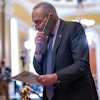SEOUL, South Korea (AP) -- South Korean police on Monday raided the offices of civic groups that have led weeks of protests against a government plan to resume U.S. beef imports.
Authorities searched the Seoul offices of two civic groups and confiscated computers, documents and materials used during rallies. One senior civic group official was arrested on charges of instigating violent protests, police said.
Police also arrested 18 labor activists who blocked U.S. meat from leaving a storehouse.
The state-run quarantine service said earlier it had inspected about 94 tons of U.S. beef, allowing local importers to put it on store shelves. However, no beef had been shipped as of Monday afternoon amid the demonstrations, according Agriculture Ministry spokesman Kim Jung-wook.
Daily candlelight rallies have been held in Seoul to voice fears about the possible health risks of U.S. beef, such as mad cow disease, following an accord in April to restart imports. The protests, which have been joined by a variety of liberal groups angered by the policies of the new conservative President Lee Myung-bak, have sometimes turned violent.
Clashes flared again over the weekend after officials began inspecting U.S. beef, with more than 200 injured after a Saturday night protest.
The government had suspended an April import accord with the United States in the face of protests. Seoul negotiated an amendment with Washington in June limiting imports to beef from cows younger than 30 months, believed to be at less risk of disease.
The beef dispute forced President Lee to replace top advisers and his entire Cabinet offered to resign following earlier rallies opposing the beef deal drew up to 80,000 people. Police began enforcing a ban on rallies Sunday and arrested about 130 protesters, but no serious clashes or injuries were reported.
U.S. beef has been banned for most of the time since late 2003, when the first case of mad cow disease in the U.S. was discovered.






















